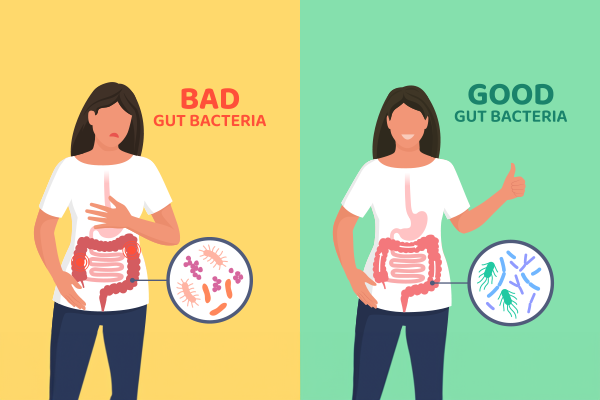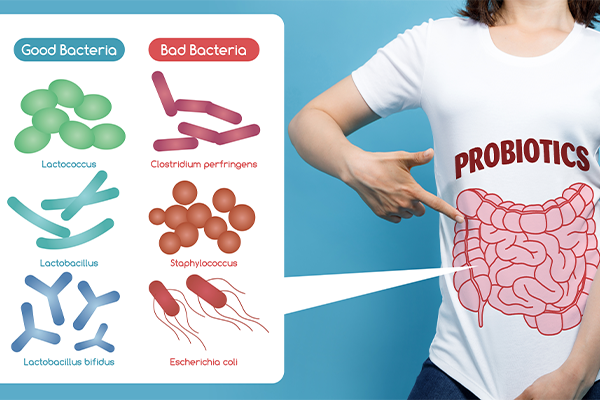
Digestive health is a cornerstone of overall well-being. A healthy digestive system ensures that our bodies efficiently absorb nutrients, maintain a strong immune system, and keep us energized throughout the day. However, many people experience digestive issues such as bloating, constipation, and indigestion, which can significantly impact their quality of life. By making mindful dietary changes, we can support our digestive health and improve our overall wellness. Incorporating foods good for digestion into our meals can play a vital role in maintaining gut health.
Synopsis
Foods to Include for Better Digestion
Incorporating certain foods into your diet can promote a healthy digestive system. Here are some key categories of foods that aid digestion:
-
Fiber-Rich Foods: Fiber is essential for healthy digestion as it adds bulk to the stool and helps it pass more easily through the digestive tract. Fruits like apples, berries, and pears, vegetables such as broccoli, carrots, and leafy greens, and whole grains like oats, quinoa, and brown rice are excellent sources of fibre. These are some of the best foods for digestion and contribute to regular bowel movements.
-
Probiotics: Probiotics are beneficial bacteria that support gut health. Foods like yoghurt, kefir, sauerkraut, kimchi, and other fermented foods are rich in probiotics. These foods help maintain a healthy balance of gut bacteria, which is crucial for digestion and overall health. Consuming probiotic-rich foods that help digestion can reduce bloating and improve gut function.
-
Prebiotics: Prebiotics are non-digestible fibres that feed the good bacteria in your gut. Foods like garlic, onions, leeks, asparagus, and bananas are great sources of prebiotics. Including these in your diet can enhance the growth of beneficial bacteria and improve digestive health. Pairing prebiotic foods with probiotics ensures a balanced gut microbiome, making them some of the best foods for digestion.
-
Hydration: Staying hydrated is vital for digestion. Water helps break down food so that your body can absorb nutrients. It also softens stool, preventing constipation. Aim to drink at least 8 glasses of water a day, and consider including hydrating foods like cucumbers, watermelon, and oranges in your diet. Hydration is essential for foods that aid digestion to work effectively in the gut.
More Reads: Digestive Problems In Children What Parents Need To Know
Foods to Avoid for a Healthy Gut
Just as there are foods that promote digestive health, there are also foods that can hinder it. Here are some foods to avoid:

-
Processed Foods: Processed foods often contain high levels of unhealthy fats, sugars, and additives that can disrupt digestion. These foods can lead to inflammation and an imbalance of gut bacteria. Try to limit your intake of processed snacks, fast food, and sugary beverages.
-
High-Fat Foods: Foods high in fat can slow down the digestive process and cause discomfort. Fried foods, fatty cuts of meat, and heavy cream-based sauces are examples of high-fat foods to avoid. Instead, opt for lean proteins and healthy fats like those found in avocados, nuts, and olive oil, which are foods good for digestion.
-
Artificial Sweeteners: Artificial sweeteners, such as aspartame and sucralose, can cause digestive issues like bloating and gas. These sweeteners are often found in diet sodas, sugar-free candies, and some processed foods. Consider using natural sweeteners like honey or maple syrup in moderation.
-
Dairy Products: Many people are lactose intolerant, meaning they have difficulty digesting lactose, the sugar found in milk. This can lead to symptoms like bloating, gas, and diarrhoea. If you suspect lactose intolerance, try lactose-free dairy products or plant-based alternatives like almond milk or soy yoghurt, which are foods that help digestion.
The Role of Lifestyle in Digestive Health
Diet is just one aspect of maintaining a healthy digestive system. Lifestyle factors also play a significant role:
-
Regular Exercise: Physical activity helps keep food moving through your digestive system, reducing the risk of constipation. Aim for at least 30 minutes of moderate exercise, such as walking, cycling, or swimming, most days of the week.
-
Stress Management: Stress can negatively impact your digestive health, leading to issues like irritable bowel syndrome (IBS) and indigestion. Practice stress-reducing techniques such as yoga, meditation, deep breathing exercises, or spending time in nature.
-
Eating Habits: How you eat is just as important as what you eat. Eating slowly and mindfully can help your body properly digest food. Try to eat at regular intervals and avoid skipping meals. Chewing your food thoroughly and avoiding distractions like TV or smartphones during meals can also improve digestion.
Special Diets for Digestive Health
Certain diets can be particularly beneficial for those with specific digestive issues:
-
Low-FODMAP Diet: This diet is designed for people with IBS and involves avoiding foods that are high in certain fermentable carbohydrates. Foods like garlic, onions, and certain fruits and vegetables are restricted, while others are allowed. This diet can help reduce symptoms like bloating, gas, and abdominal pain.
-
Gluten-Free Diet: For individuals with celiac disease or gluten sensitivity, avoiding gluten is essential. Gluten is a protein found in wheat, barley, and rye. A gluten-free diet involves eliminating these grains and choosing alternatives like rice, quinoa, and gluten-free oats, which are foods that aid digestion.
-
Anti-Inflammatory Diet: Chronic inflammation in the gut can lead to digestive issues. An anti-inflammatory diet focuses on foods that reduce inflammation, such as fatty fish, leafy greens, nuts, and berries. Avoiding processed foods, sugary drinks, and red meat can also help reduce inflammation.
Natural Remedies and Supplements

In addition to dietary changes, natural remedies and supplements can support digestive health:
-
Herbal Teas: Herbal teas like peppermint, ginger, and chamomile can soothe the digestive system and alleviate symptoms like nausea and indigestion. These teas have been used for centuries for their digestive benefits.
-
Digestive Enzymes: Digestive enzymes can help break down food and improve nutrient absorption. They are particularly useful for people with conditions like lactose intolerance or pancreatic insufficiency. Consult with a healthcare provider before starting any enzyme supplements.
-
Fibre Supplements: If you're not getting enough fibre from your diet, fibre supplements can help. Psyllium husk, methylcellulose, and inulin are common types of fibre supplements that can promote regular bowel movements and improve overall digestive health.
Consult our specialized Gastroenterologist in Patiala for personalised treatment and care.
More Reads: Basic Treatment For Gastric Problems
Here are some recipes that promote digestive health, presented in a table format for easy reference:
|
Recipe Name |
Ingredients |
Instructions |
|
Fiber-Rich Smoothie |
1 banana, 1 cup spinach, 1 apple, 1 tbsp chia seeds, 1 cup almond milk |
Blend all ingredients until smooth. Enjoy it as a nutritious breakfast or snack. |
|
Probiotic Yogurt Parfait |
1 cup Greek yoghurt, 1/2 cup granola, 1/2 cup mixed berries, 1 tbsp honey |
Layer yoghurt, granola, and berries in a glass. Drizzle with honey. Perfect for breakfast or dessert. |
|
Garlic and Onion Soup |
1 onion (chopped), 4 garlic cloves (minced), 4 cups vegetable broth, 1 tbsp olive oil |
Sauté onion and garlic in olive oil until soft. Add broth and simmer for 20 minutes. Serve warm. |
|
Hydrating Cucumber Salad |
1 cucumber (sliced), 1/2 red onion (sliced), 1 tbsp olive oil, 1 tbsp vinegar, salt and pepper to taste |
Mix all ingredients in a bowl. Chill before serving. Great as a refreshing side dish. |
|
Low-FODMAP Stir-Fry |
1 cup chicken breast (sliced), 1 cup bell peppers (sliced), 1 cup zucchini (sliced), 2 tbsp soy sauce, 1 tbsp olive oil |
Sauté chicken in olive oil until cooked. Add vegetables and soy sauce, and stir-fry until tender. |
|
Anti-Inflammatory Turmeric Tea |
1 cup hot water, 1 tsp turmeric powder, 1/2 tsp ginger powder, 1 tbsp honey, 1 tbsp lemon juice |
Mix all ingredients in a cup. Stir well and enjoy warm. |
|
Peppermint Ginger Tea |
1 cup hot water, 1 peppermint tea bag, 1 tsp grated ginger, 1 tbsp honey |
Steep the tea bag and ginger in hot water for 5 minutes. Remove the tea bag, stir in honey, and enjoy. |
Read More - Iron-Deficiency Anaemia: Causes, Symptoms, and Treatment
Conclusion: Making Sustainable Changes
Making dietary changes for digestive health doesn't have to be overwhelming. Start by gradually incorporating more fiber-rich foods, probiotics, and prebiotics into your diet. Avoid processed foods, high-fat foods, artificial sweeteners, and dairy if you suspect intolerance. Remember to stay hydrated, exercise regularly, manage stress, and practice mindful eating.
By making these sustainable changes, you can support your digestive health and enjoy the long-term benefits of a healthy gut. Improved digestion can lead to increased energy levels, better nutrient absorption, and a stronger immune system.
FAQ's
Water, herbal teas, and broths are hydrating and can aid in digestion.
Artificial sweeteners can disrupt the balance of gut bacteria and may lead to digestive issues.
Prebiotics feed beneficial gut bacteria, promoting a healthy gut microbiome.
Yes, fried foods are high in unhealthy fats that can harm the gut microbiome and cause inflammation.
Consuming yoghurt, kefir, sauerkraut, and kimchi can help increase your intake of probiotics.



















 8 Min Read
8 Min Read









